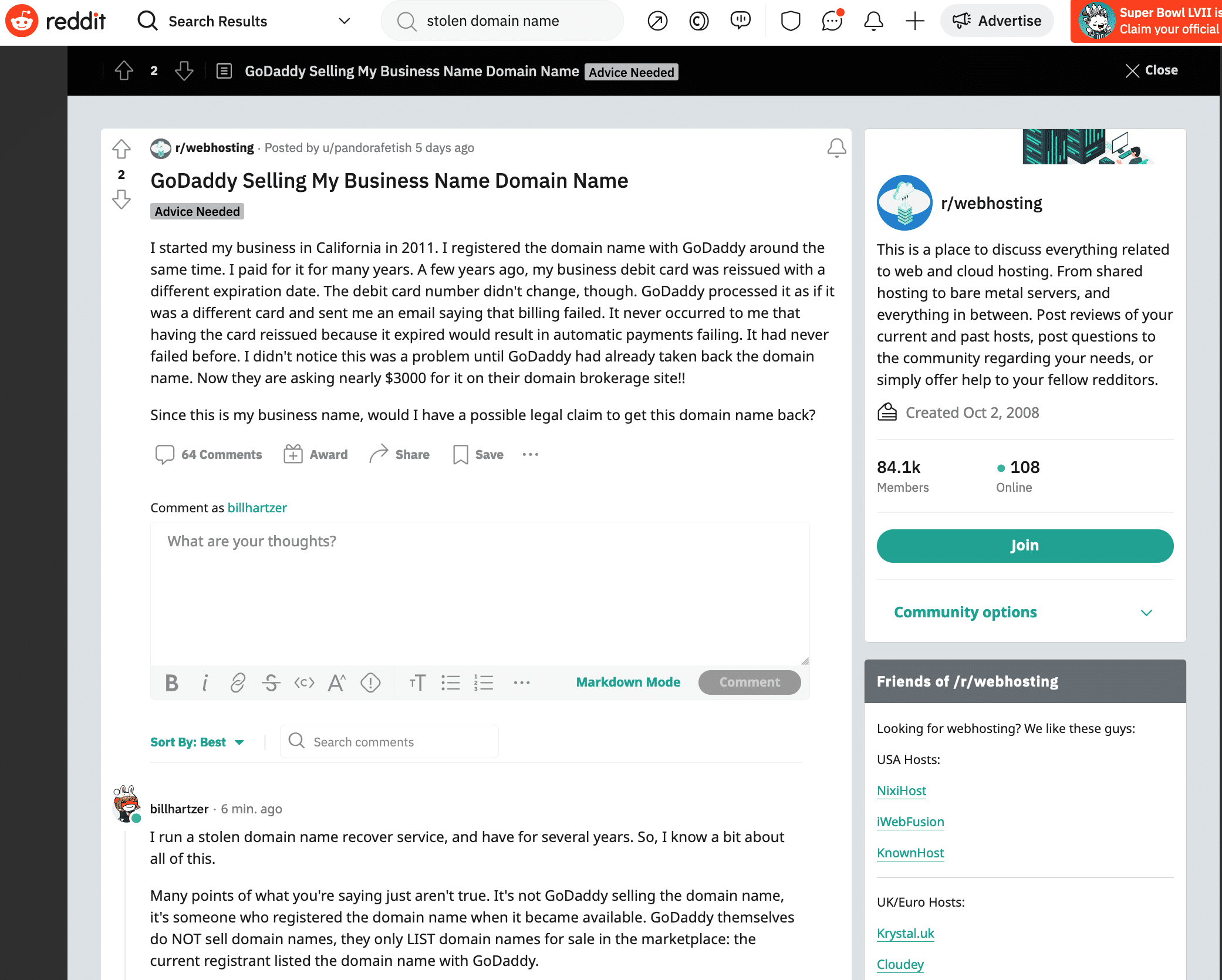There is a post on Reddit that details how a business owner lost their domain name because they relied on GoDaddy’s Auto Renew service to renew their domain name. Their credit card failed to be charged, and they lost the domain name.
Here is the question/post that was made, describing the situation:
“I started my business in California in 2011. I registered the domain name with GoDaddy around the same time. I paid for it for many years. A few years ago, my business debit card was reissued with a different expiration date. The debit card number didn’t change, though. GoDaddy processed it as if it was a different card and sent me an email saying that billing failed. It never occurred to me that having the card reissued because it expired would result in automatic payments failing. It had never failed before. I didn’t notice this was a problem until GoDaddy had already taken back the domain name. Now they are asking nearly $3000 for it on their domain brokerage site!!
Since this is my business name, would I have a possible legal claim to get this domain name back?”
Here is my response. I really hope that you go right now and renew all of the domain names that are important to you, and do NOT rely on auto renew at your domain name registrar.
I run a stolen domain name recover service, and have for several years. So, I know a bit about all of this.
Many points of what you’re saying just aren’t true. It’s not GoDaddy selling the domain name, it’s someone who registered the domain name when it became available. GoDaddy themselves do NOT sell domain names, they only LIST domain names for sale in the marketplace: the current registrant listed the domain name with GoDaddy.
What occurred is that the domain name was set (by you) on Auto Renew. That is the #1 way that people LOSE their domain names, as they rely on the payment going through automatically. In many cases it does not, and the same thing happens to many other people, just like you.
You failed to renew the domain name, so GoDaddy either puts it up for auction before it “drops” and becomes available for anyone to register, or they let the domain name expire (it drops) and anyone can register the domain name. Not sure what happened in your case, but the current registrant acquired the domain name legally, it was NOT stolen from you. They have rights to the domain name unless you can prove: they registered or acquired it in bad faith or you have a trademark on the word in the domain name. If that’s the case, you can filed a UDRP domain dispute (a URS if it’s not a .com domain). The UDRP filing fee is $1500 and you have to have a domain attorney file and defend the UDRP dispute.
You have a few options at this point to get the domain name back
- Contact the current registrant of the domain and make them an offer. Usually they may accept your offer for $1,000 for example if they have it listed for $3,000. But they may stick to their price.
- You can wait and do nothing, place a backorder on the domain name, and once it expires you’ll have a good chance of getting the domain name IF the current registrant does not renew it.
- If you feel the current registrant acquired the domain name “in bad faith” such as you owning a trademark on the word in the domain, OR you were doing business on that name in the past (you had a live website on it), you could claim a “commonlaw trademark” when you file a UDRP.
If anyone is reading this, PLEASE go RIGHT NOW and renew your domain name for at least 2 years in advance, I recommend at least 5 years in advance. Set calendar reminders to renew your domain name as a reminder if you must. Do NOT ever rely on auto-renew on a domain name you can’t afford to lose. Because chances are that you WILL lose the domain name, and auto renew will fail.
I’m sorry this happened to you. But, it happens to a LOT of people, as we are contacted every single day about someone “stealing their domain name” which unfortunately isn’t the case, like your case here. It’s your responsibility to renew the domain name, and the registrars are providing “auto renew” service as a courtesy to customers.
